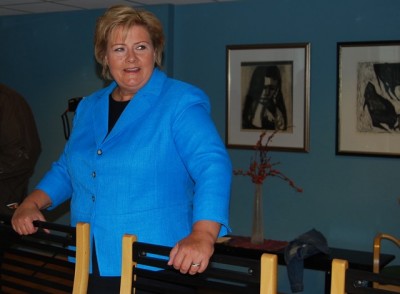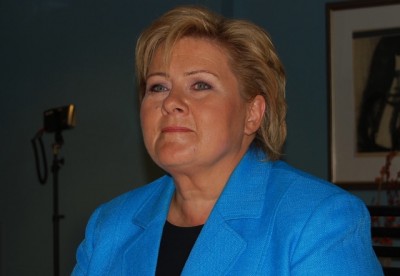With just a few days left before Norwegian voters cast their ballots, Conservative Party leader and election frontrunner Erna Solberg is ready to grip government power in what she calls a potentially historic election. She insists voters will see real change if the non-socialist bloc wins, even though her party may be forced to make compromises.

“The most important thing,” she told foreign correspondents in Oslo on Thursday, is that there has “never been such a clear signal” to form a non-socialist coalition heading into a election. And she said that if her party wins at least 27.4 percent of the vote (polls suggest it will be more), Solberg claimed “we will have had the largest jump” ever registered by any party from one election to another. In 2009, the Conservative Party (Høyre) got just 17.2 percent of the vote.
It remains unclear, though, what voters can expect from such a non-socialist coalition that Solberg would lead, until the results of all the parties are tallied up. There are big political differences on several issues between some of its potential members (the Progress Party, for example, wants to cut protectionist tariffs and ease Norway’s tough laws regulating the sale of alcoholic beverages, while the Christian Democrats don’t want to do either) and it would be up to Solberg to strike compromises.
On several issues, from respect for the rule limiting expenditure of oil revenues to oil exploration off scenic Lofoten and Vesterålen, the Conservatives are arguably more in sync with their arch-rival Labour Party (Arbeiderpartiet) than with some of their potential government partners. That has led some other rivals, like Rasmus Hansson of the Green Party (MDG), to claim that the Conservatives and Labour are much the same and there won’t be any major change no matter who wins.

“We are a liberal conservative party, we do not make revolutions,” Solberg conceded. “In a small country like Norway, we do agree on many issues.” Norway’s social welfare state is so firmly embedded, it seems, that it tends to move forward no matter who’s in office.
“The biggest difference?” Solberg mused. “We have the most pragmatic view of engaging the private sector.” She maintains that it’s not as important how a job gets done as that it just gets done. She says Norwegians will see more pragmatism in a government she leads, through more public-private partnerships, for example, and more use of the volunteer sector.
Education policy is another area where the Conservatives and Labour have different ideas and solutions for improving Norway’s public schools, as they do on taxes and especially Norway’s fortune tax, which taxes individual net worth year after year. Solberg wants to phase it out, while Labour and its partners in the current left-center coalition have wanted to keep it.
Much of Norway’s foreign policy, Solberg acknowledged, will likely stay the same with at least one major exception: All four non-socialist parties, she said, support Norway’s European Economic Area (EEA) agreement for doing business with the EU (known as the EØS-avtale). Labour’s two partners in the current coalition, the Socialist Left (SV) and the Center Party (Sp), are both anti-EU and Sp complains about the EØS at every opportunity. “We won’t have that same tension,” Solberg said. “We would be more European-oriented.” She foresees “much more cooperation” with the EU. Norwegians may also see new guidelines for foreign aid, a firmly pro-human rights line regarding relations with neighbouring Russia and perhaps a more “pro-Israel” tone in the Middle East, although Solberg didn’t seem to like her own use of the term. She insists the rule limiting use of oil revenues will be respected but there’s speculation Høyre may give up its eagerness for oil exploration off Lofoten. Other issues will be up for negotiation.

Solberg continues to want to talk mostly about her own party’s ideas and solutions, not those of other parties, and she steered clear of discussing how a prospective non-social coalition would be negotiated and who would be in it. “That’s entirely up to the election results,” her spokesman Haakon Dagestad said after the hour-long session with Solberg. Asked whether the Conservatives will need to break some campaign promises if the party needs the Christian Democrats, for example, to form a government, Dagestad confirmed that’s entirely possible but added “I have to give you the very boring answer: We have to wait to see the election results.”
Solberg herself acknowledges that “some might say” the issues in Norway aren’t very tough because the economy is so strong and Norway “is in a very different position” than most other countries. “Even though we have a good economy, though, it may not last, and we believe the current government isn’t investing enough of the oil money correctly,” she said. “In 20 years the oil impact will be lessened.”
Preparing for the end of oil
Despite criticism that Norway’s established parties aren’t doing enough to prepare for an economy without today’s oil and its high prices, Solberg claims she is indeed thinking about it and keen to invest more in Norwegian universities and research to boost knowledge, especially in science and math, “since we are a technology country.” She wants to improve health care and use more private providers to reduce the long waiting lists of patients waiting for treatment. She wants to improve roads and infrastructure to boost productivity. Norway needs more highly skilled workers from abroad, she said, but she also wants to restrict the flow of unskilled workers and asylum seekers to those who really need protection.
She defended her biggest potential partner, the Progress Party, saying its image abroad is much better than in Norway and that they’re not viewed mostly as an anti-immigration party. “I think their image (in Norway) is distorted,” said Solberg, who earlier has said that it’s become easier to get along with Progress Party leader Siv Jensen.
Solberg rejects Labour’s inferences that “they’re the only ones” who can run the economy well. “I can’t remember an election when Labour has been more scared about spending,” Solberg said. “The Conservatives’ core policy is stability.” She dismisses Labour’s warnings that the non-socialists’ state budgets will be inflationary.
Softer image
On a personal note, she admitted she’s softened her image a bit from the days she was dubbed as “Jern Erna” (Iron Erna). Surveys showing that her party was seen as “not being so concerned about everyday life” surprised her, claiming she views her party as caring and concerned about people. Now she’s been actively working to promote a more “people-oriented” image (visiting hospital patients, or example, while Prime Minister Jens Stoltenberg was having dinner with US President Barack Obama this week) but “we won’t compromise on the types of policies regarding how people should live.”
On Monday the people will be making their choices, with election results due to start clicking in Monday evening after polls close at 9pm. Then Solberg will learn whether she’ll really be Norway’s next prime minister, and then sort out who her fellow ministers will be.
newsinenglish.no/Nina Berglund

